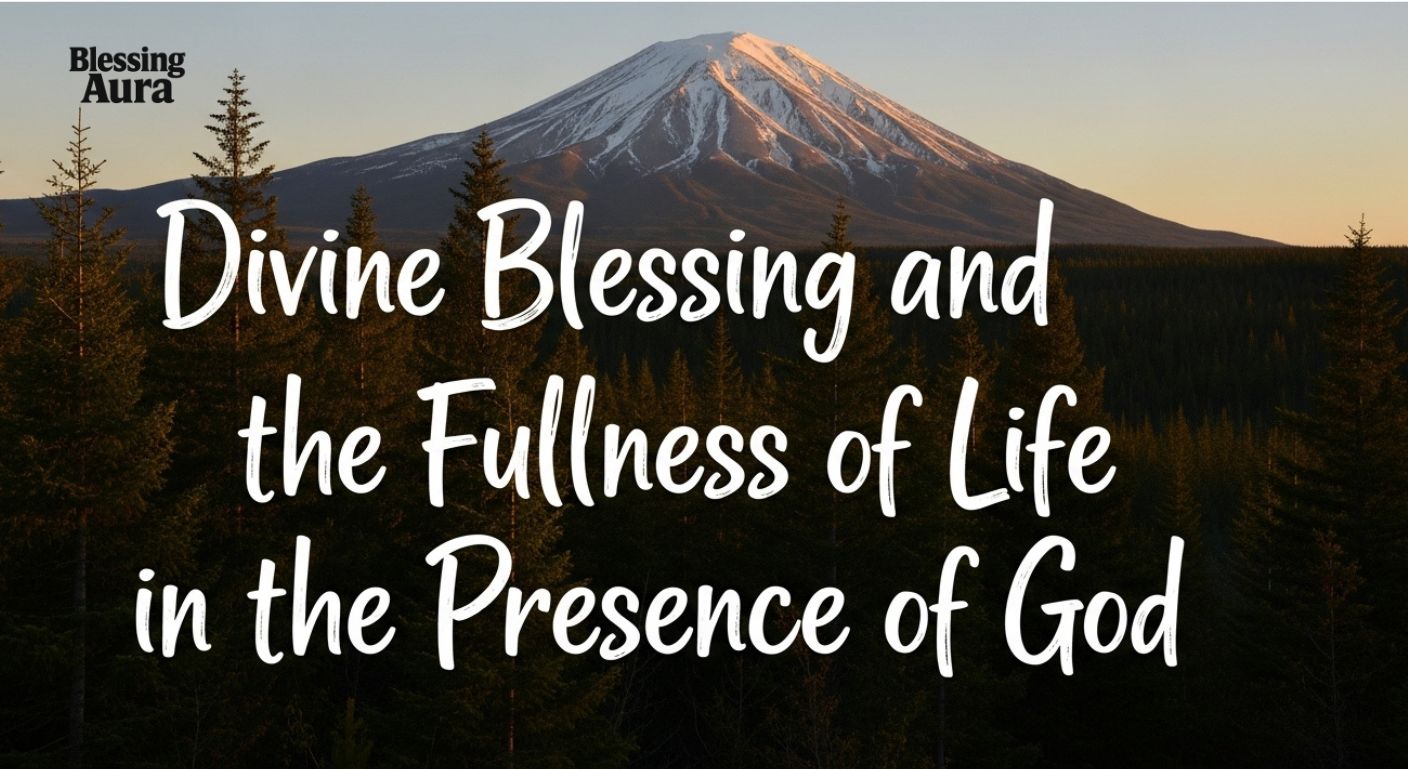Divine Blessing and the Fullness of Life in the Presence of God What does it truly mean to be “blessed”? Many people in the U.S. say they are blessed when things go well—when they get a raise, a car, or even a sunny day. But the Bible means something deeper. Divine blessing and the fullness of life in the presence of God is not just about things. It’s about a relationship—a covenant—with the Triune God. This idea runs all through the Bible, from Genesis 1–3 to the new heavens and new earth.
This blog post will explore the rich meaning of divine blessing through the lens of biblical theology, guided by William R. Osborne’s book Divine Blessing and the Fullness of Life in the Presence of God, part of the Short Studies in Biblical Theology series by Crossway (publisher). We’ll look at the blessings of God in every stage of redemptive history, and why real blessing is more than wealth—it’s a gift of God’s favor, rooted in a covenant relationship.
A Biblical Theology of Blessing in Covenant Relationship
In the Bible, blessing always comes through relationships. Covenant blessings are given by God to His people, not because they deserve it, but because He chooses to love them. From the start, in Genesis 1–3, God blesses Adam and Eve. They are made to live in His presence and enjoy the fullness of life. But when sin enters, the blessing is broken. Still, God promises to restore it through a chosen people.
William R. Osborne shows that blessing is not random. It flows through the covenant relationship. In the Old Testament, this includes the promises to Abraham in Genesis 12–50, the laws in Exodus, and the worship life of Israel. Blessings come when people live in faith-driven obedience, but they are never earned. This truth is echoed in Reformed theology, which sees both material and spiritual benefits tied to covenant life with God.
Rethinking Blessing: A Biblical Response to Cultural and Prosperity Misuse
In today’s culture, people often say “I’m blessed” as a humble brag. But Osborne’s soft polemic challenges this. Real divine blessing is not just about nice things happening. It’s about being near God. The prosperity gospel twists this idea by teaching that blessing = wealth. But the Bible says clearly that prosperity ≠ righteousness and suffering ≠ wickedness. Many of God’s people suffer deeply, like Job or the psalmists in Job and Psalms.
Blessing is often misunderstood even in churches. In one story Osborne shares, someone asked, “If God gives me a car, is that a blessing?” The answers varied. But the right question is, “Does this draw me closer to the Triune God?” Blessing is not just about gain. It’s about growing deeper in a relationship. That’s why real blessing might even come through righteous suffering or loss.
Accessible Yet Substantive: Osborne’s Theological Depth with a Light Touch
One of the best parts of this book is how William R. Osborne writes. He is deep but simple. His theology is sound, but his words are easy to read. This makes the book perfect for both new believers and seminary students. He explains big truths like the covenant relationship and eschatological hope using clear language and even humor.
For example, Osborne jokes that the promised land wasn’t just “a place for Abram to tie up his camels.” But behind the light tone is real insight. He connects academic ideas with daily faith. His work has strong roots in a conservative theological perspective, but he also uses insights from critical/liberal vs. conservative debate in his footnotes. It’s a book that teaches truth without sounding too academic.
Defining Blessing: Osborne’s Theological and Linguistic Framework
To understand blessing, Osborne breaks the word into three ideas: the act of blessing, the gift itself, and the state of being blessed. This helps us see that blessing is more than stuff. It’s also about the status of a person in God’s eyes. This view fits the whole Bible. It matches both the Hebrew word happy/blessed (אשׁרי) and the Greek μακάριος, both used in the Psalms and the Beatitudes.
Osborne even talks about passages where the word “bless” isn’t used, but the idea is there. For example, in Romans 8:32, Paul says God “graciously gives us all things.” That’s a blessing! This deep and careful word study helps readers see the full picture of divine blessing and the fullness of life in the presence of God.
Tracing Blessing Through Redemptive History: From Eden to Eternity
Blessing is not a random theme—it’s the whole storyline of the Bible. In Genesis 1–3, God blesses creation. But sin brings a curse. In Genesis 12–50, God begins to restore blessing through Abraham. The nation of Israel is blessed to be a blessing to the nations. In Exodus, we see blessing connected to worship, law, and the presence of God in the tabernacle.
Later, in the New Testament blessings, Jesus brings the fullness of life. He becomes the way we experience God’s favor. Yet the blessings are still both material and spiritual, but with a stronger spiritual focus. The final blessing comes in the eschaton—the new heavens and new earth. There, God’s people will enjoy eternal blessing in a relational context with no more curse or suffering.
True Blessing: More Than Wealth, Rooted in Covenant and Faithful Obedience
What makes a person truly blessed? It’s not money or comfort. True blessing is being in a covenant relationship with God. This involves faith-driven obedience, but not legalism. We obey because we trust God. And even when life is hard, that doesn’t mean the blessing is gone. The Old Testament blessings and the New Testament blessings both show this balance.
William R. Osborne reminds us that blessing includes physical and spiritual gifts. But most of all, it includes God Himself. If a blessing pulls us away from God, it might not be a blessing at all. This kind of clear, honest teaching is rare—and needed—in a time when the prosperity gospel is still popular in many churches.
Loving the Giver More Than the Gift: A Pastoral Call to True Blessing
Here’s one of Osborne’s most powerful points. He tells a story about a child at Christmas. The child gets so excited about the gift that he forgets to thank his parents. That’s how we act with God. We focus on the gifts and ignore the Giver. This “Child-at-Christmas analogy” hits home.
So, what do we do? Ask yourself: does this blessing draw me closer to the Triune God? Or is it a distraction? A real blessing builds love, not just joy. This part of the book speaks straight to the heart. It’s where spiritual formation and doctrine come together in real life.
In Step with Reformed Theology: Blessings Both Earthly and Eternal
This view of blessing matches classic Reformed theology. The Second Helvetic Confession (Chapter XIII) teaches that believers in both testaments receive two kinds of promises. Some are for now, like food and land. Others are for eternity, like forgiveness and eternal life. William R. Osborne follows this same view.
He shows that covenant blessings always include both physical and spiritual parts. But they are not earned. They come through grace. This fits with what pastors and teachers at RTS (Reformed Theological Seminary) teach. It’s a theology that holds up over time and helps Christians live with wisdom.
A Must-Read for RTS Students and Pastors: Deepening Understanding of Biblical Blessing
If you are a student or pastor at RTS, or just someone wanting to grow in truth, this book is for you. William R. Osborne gives a deep, rich look at divine blessing and the fullness of life in the presence of God. He does so without making it hard to read or boring.
You will learn how to teach others. You will also grow in your own heart. This book helps you rethink what it means to be happy/blessed, and it roots your faith in the Bible, not in feelings or trends. It’s more than studying. It’s a tool for transformation.
FAQ’s
What does the Bible say about Divine Blessing and the Fullness of Life in the Presence of God?
The Bible shows that Divine Blessing and the Fullness of Life in the Presence of God come through covenant love, faith, and God’s constant care from Genesis to Revelation.
How can someone truly experience Divine Blessing and the Fullness of Life in the Presence of God?
To enjoy Divine Blessing and the Fullness of Life in the Presence of God, one must walk in faith-driven obedience and trust God’s promises beyond wealth or comfort.
Why does Divine Blessing and the Fullness of Life in the Presence of God matter more than material wealth?
Divine Blessing and the Fullness of Life in the Presence of God offer eternal joy, not just temporary gain, and bring peace even in hardship or righteous suffering.
What is the connection between Jesus and Divine Blessing and the Fullness of Life in the Presence of God?
Jesus brings Divine Blessing and the Fullness of Life in the Presence of God by restoring relationship through the cross, fulfilling all covenant blessings from Eden to eternity.
How is Divine Blessing and the Fullness of Life in the Presence of God different from the prosperity gospel?
Divine Blessing and the Fullness of Life in the Presence of God centers on God’s presence, not riches, showing that prosperity ≠ righteousness and suffering ≠ wickedness.
Conclusion
Divine Blessing and the Fullness of Life in the Presence of God is much more than having money, health, or success. It is about being close to the Triune God, walking in faith, and living in His grace. This blessing brings deep joy, peace, and lasting hope. It includes both material and spiritual benefits, but it always flows from a strong covenant relationship with God.
From Genesis 1–3 to the new heavens and new earth, we see how God has blessed His people through His presence. True blessing comes not from things, but from knowing Him. Even during righteous suffering, God is near. Divine Blessing and the Fullness of Life in the Presence of God offers strength in weakness and hope in sorrow. It invites us into life with Him forever. This is the real, lasting blessing we all long for.

Welcome to Blessing Aura! I’m Muhammad Anas, an Digital Marketer and Ebay Dropshipping Expert with 1 year of experience, I help business, brands and store to grow online. My goal is to run ads and sell effective products for everyone, Let’s achieve more together!

